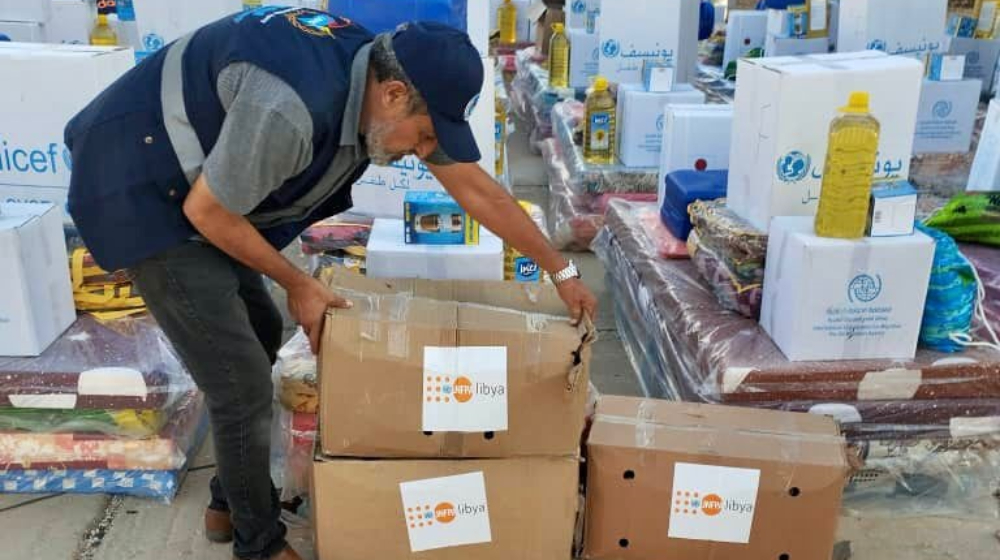News
“Psychological wounds will take time to heal”: Treating immense trauma in Derna in the aftermath of Storm Daniel
- 05 October 2023
News
DERNA, Libya – “The hospital was overwhelmed with emergency cases and dead bodies,” said 29-year-old gynaecologist Dr. Nehal Anwar, who works at a maternity hospital in Derna, a port city on Libya’s northeast coast. “Even those who had survived were in a critical condition, and some were experiencing vivid visions of being trapped under the floods.”
“It's still unbelievable to me.”
Dr. Anwar was working the night shift on 10-11 September when a sound like thunder reverberated through Derna. Though she didn’t know it at the time, the sound was from two nearby dams bursting, and a wall of water was on its way.
According to government officials, 4,255 are presumed dead and 40,000 have been displaced from their homes in the aftermath of Storm Daniel, which saw heavy rains and flooding across Libya’s northeast coast on 10 September – and caused the country’s worst natural disaster in decades.
The epicentre of the destruction is Derna, where entire neighbourhoods were swallowed whole by torrential floods and thousands of people are still missing. Some of those still unaccounted for are loved ones of Dr. Anwar.
“I lost many family members, including my aunt's husband and my cousins,” she said. “Additionally, colleagues were among those who tragically lost their lives.”
Emotionally shattered
Storm Daniel’s devastating impact on Derna is obvious in its path of destruction; according to one government official, a full quarter of the city has simply vanished.
Less obvious, though no less important are the mental scars left behind by the disaster. Dr. Anwar said she has encountered people at the hospital wondering how to go on after losing all their family members in the floods.
“The women I am encountering at the hospital are in great need of psychosocial support,” she said. “Many appear emotionally shattered, particularly those who are pregnant, as they are coping with the loss of relatives and housing.”
Across the areas affected by the floods in Libya, approximately 24,000 of the women and girls in need of humanitarian assistance are believed to be pregnant and lacking essential sexual and reproductive health services. About one in ten of that number are expected to give birth in the next month.
To fill the gap in services and support, “UNFPA is mobilizing to deliver life-saving health care and supplies to women and girls in need”, said UNFPA Executive Director Dr. Natalia Kanem.
The agency has sent mobile medical teams to five primary health facilities in Derna to supplement maternal and child health service provision. And through its implementing partner, Amazonsat, UNFPA has also deployed mobile psychosocial workers to visit women in Benghazi displaced by the crisis to offer mental health support.
“I believe that the combination of reproductive health services, psychosocial support and housing assistance is paramount in addressing the current needs of women in this crisis,” said Dr. Anwar.

Persevering through personal pain
After working through the night of the dams’ collapse, Dr. Anwar left her hospital at 10 a.m. on 11 September, desperate to find her mother.
They reunited at Dr. Anwar’s sister’s house, where Dr. Anwar spent the next several days waiting for heartbreaking news to trickle in about the loss of loved ones and the extent of the damage to Derna. “I was mentally overwhelmed and incapacitated,” she said.
After four days, however, Dr. Anwar returned to the hospital with a view to using her skills to support others in crisis.
“I didn't want to stay at home and feel helpless,” she said. “I have been coming [to the hospital] on a daily basis, trying to help people to the best of my abilities.”
Those skills will be much in demand with hundreds of women in Derna expected to give birth in the coming weeks. Pregnancy and childbirth do not stop for emergencies; in fact, a woman gave birth in Derna’s maternity ward as Storm Daniel raged on 11 September, which is now receiving UNFPA support.
“The heroic work of Dr. Anwar and many other caregivers in Libya inspires us all. UNFPA multiplies its efforts on all fronts to help women give birth safely and youth recover from psychological trauma and thrive again,” said Mr. Samir Anouti, UNFPA Representative in Libya.
New life continues to enter the city, even against the backdrop of devastation and death.
“It is challenging to imagine how we can rebuild and restore the city after such devastating events,” said Dr. Anwar. “Even if the city is reconstructed physically, the emotional and psychological wounds will take time to heal.”